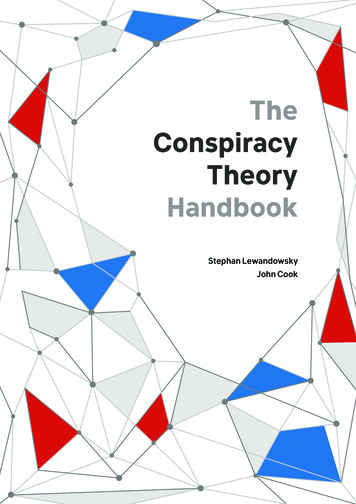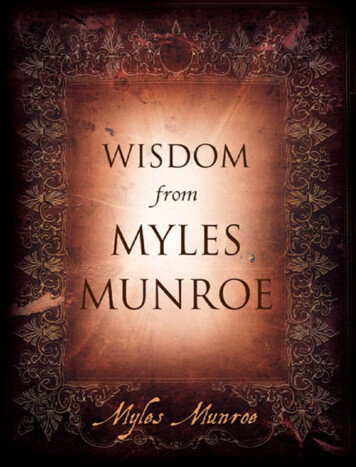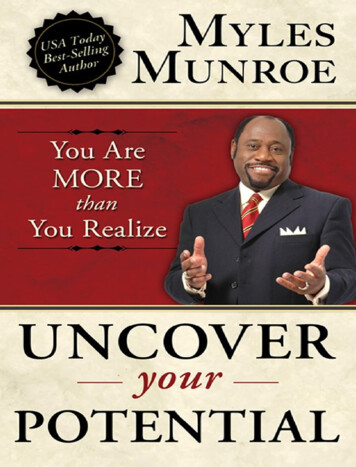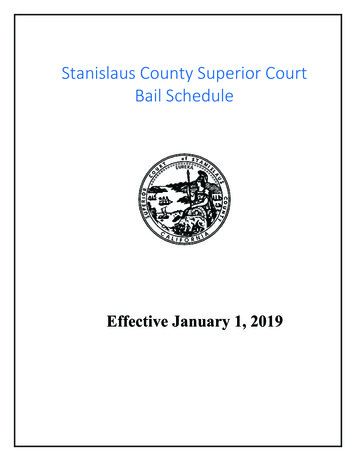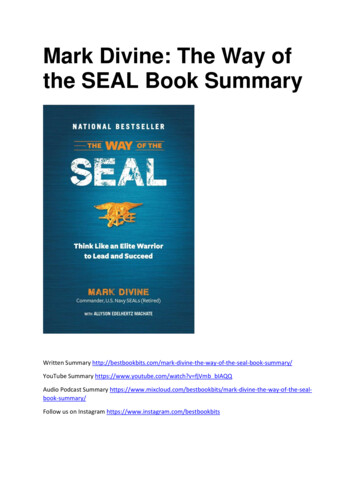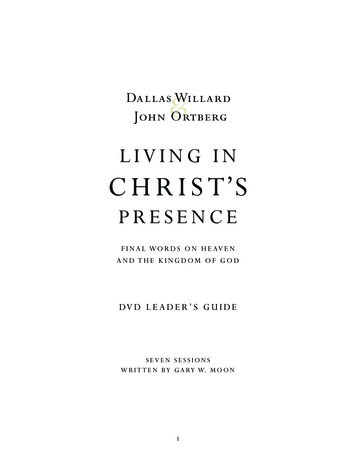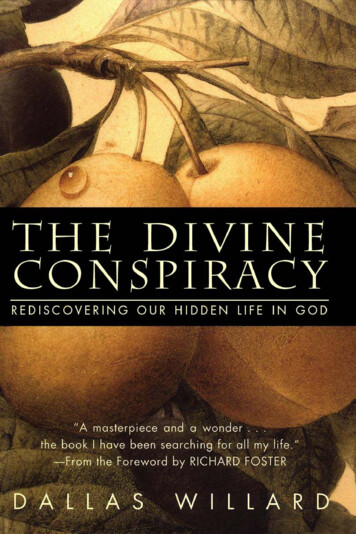
Transcription
REVELATION
THE DIVINECONSPIRACYREDISCOVERING OURHIDDEN LIFE IN GODDALLAS WILLARD
R. R. BrownJoe Henry HankinsJohn R. RiceLee RobersonJ. I. Willard“In those days there were giants in the land.”
The kingdom of the heavens is similar to a bit of yeast which a womantook and hid in half a bushel of dough. After a while all the doughwas pervaded by it.JESUS OF NAZARETHYou must have often wondered why the enemy [God] does not makemore use of his power to be sensibly present to human souls in anydegree he chooses and at any moment. But you now see that theirresistible and the indisputable are the two weapons which the verynature of his scheme forbids him to use. Merely to over-ride a humanwill (as his felt presence in any but the faintest and most mitigateddegree would certainly do) would be for him useless. He cannotravish. He can only woo. For his ignoble idea is to eat the cake andhave it; the creatures are to be one with him, but yet themselves;merely to cancel them, or assimilate them, will not serve . Sooneror later he withdraws, if not in fact, at least from their consciousexperience, all supports and incentives. He leaves the creature tostand up on its own legs—to carry out from the will alone dutieswhich have lost all relish . He cannot “tempt” to virtue as we do tovice. He wants them to learn to walk and must therefore take awayhis hand . Our cause is never more in danger than when a human,no longer desiring, but still intending, to do our enemy’s will, looksround upon a universe from which every trace of him seems to havevanished, and asks why he has been forsaken, and still obeys.UNCLE SCREWTAPEC. S. LEWIS, THE SCREWTAPELETTERS
dgmentsChapter 1Entering the Eternal Kind of Life Nowxixvii1Chapter 2Gospels of Sin Management35Chapter 3What Jesus Knew: Our God-Bathed World61Chapter 4Who is Really Well Off?—The Beatitudes97Chapter 5The Rightness of the Kingdom Heart: Beyond theGoodness of Scribes and Pharisees129Chapter 6Investing in the Heavens: Escaping the Deceptions ofReputation and Wealth187Chapter 7The Community of Prayerful Love215Chapter 8On Being a Disciple, or Student, of Jesus271Chapter 9A Curriculum for Christlikeness311
Chapter 10The Restoration of all Things375Notes401Index421About the AuthorOther Books by Dallas WillardCoverCopyrightAbout the Publisher
FOREWORDConspiracy is the book I have been searching for all myT helife.DivineLike Michelangelo’s Sistine ceiling, it is a masterpiece and awonder. And like those famous frescoes, it presents God as real andpresent and ever reaching out to all humanity. I am struck by manythings in The Divine Conspiracy. Let me mention a few.First, I am struck by the comprehensive nature of this book. It givesme a Weltanschauung, a worldview. It provides me with the conceptualphilosophy for understanding the meaning and purpose of human existence. It shows me how to make sense out of the whole of the biblicalrecord. It helps me see that the teachings of Jesus are intelligent andvital and intently practical.The breadth of the issues covered is astonishing: from the soul’s redemption and justification to discipleship and our growth in grace todeath and the state of our existence in heaven. The middle chaptersrightly give concentrated attention to Jesus’ teaching in the Sermon onthe Mount, but Willard does even this in such a way that he actuallyteaches us the whole Bible—indeed, the whole of our life before God.Then, too, his analysis of the contemporary scene is quite remarkableand comprehensive. Incisively, he uncovers the pretense of the varioustheories, facts, and techniques of contemporary secular materialism,showing that “they have not the least logical bearing upon the ultimateissues of existence and life.” Nor does the contemporary religious sceneescape his incisive eye. In perhaps the most telling phrase of the book,he reveals the various “theologies of sin management” that plaguechurches today, both conservative and liberal. This is a book that opensme to the big picture.Second, I am struck by the accessibility of this book. I’m fully awarethat the issues discussed here are of immense importance, yet it is allso understandable, so readable, so applicable. Perhaps I feared that aworld-class philosopher would be unable to speak to my condition, butin this I was wrong. Again and again I found myself mirrored in Dr.Willard’s insights into human nature.In addition, everything Willard deals with is so intently practical.Never allowing issues to stay theoretical, he constantly weaves them
viii / The Divine Conspiracyinto the warp and woof of daily experience. His stories charm. His examples teach. Most of all, he deals with such huge human issues in suchwise and sane ways.This is never more true than in chapter 9: “A Curriculum for Christlikeness.” It contains a wealth of practical guidance into precisely howwe come to love, honor, and consistently obey “God the Father almighty,maker of heaven and earth.”Third, I am struck by the depth of this book. Willard is a master atcapturing the central insight of Jesus’ teachings. Perhaps this is becausehe takes Jesus seriously as an intelligent, fully competent Teacher. Hewrites, “Jesus is not just nice, he is brilliant.”Here I must comment on the depth of teaching on what we havecome to call the Sermon on the Mount. Most writers turn these penetrating words of Jesus into a new set of soul-crushing laws. Others,feeling the teaching is impossible to obey, try to relegate it to anothertime, another place, another dispensation. Those who reject these twooptions usually think of it simply as a loose collection of nice sayingsthrown together by unknown editors—interesting to read in a poeticsort of way, but having nothing essential to do with how we live today.What, I wondered, would Willard bring to the table?A soul-satisfying banquet, that is what. No one I have read so effectively penetrates to the heart of Jesus’ teaching. Willard’s discussion ofthe “Beatitudes,” for instance, is simply stunning, upsetting many ofour common notions of this famous passage. The entire book is wellworth that discussion alone. But he gives us more, much more—a feastfor the mind and the heart.Which leads me to my fourth, and final, observation. I am struck bythe warmth of this book. Rarely have I found an author with so penetrating an intellect combined with so generous a spirit. Clearly he hasdescended with the mind into the heart and from this place he touchesus, both mind and heart.Dallas Willard speaks words of grace and mercy to us all, and especially to those who have been crushed by the world in which we live:“The flunk-outs and drop-outs and burned-outs. The broke and thebroken. The drug heads and the divorced. The HIV positive and theherpes-ridden. The brain-damaged and the incurably ill. The barrenand the pregnant too many times or at the wrong time. The overemployed, the underemployed, the unemployed. The unemployable. The
The Divine Conspiracy / ixswindled, the shoved-aside, the replaced. The lonely, the incompetent,the stupid.” In this, and so many other ways, I find this book speakswith compassion to where we all live and move and have our being.I would place The Divine Conspiracy in rare company indeed: alongsidethe writings of Dietrich Bonhoeffer and John Wesley, John Calvin andMartin Luther, Teresa of Avila and Hildegard of Bingen, and perhapseven Thomas Aquinas and Augustine of Hippo. If the parousia tarries,this is a book for the next millennium.—RICHARD J. FOSTER
INTRODUCTIONhope is to gain a fresh hearing for Jesus, especially among thoseM ywhobelieve they already understand him. In his case, quitefrankly, presumed familiarity has led to unfamiliarity, unfamiliarityhas led to contempt, and contempt has led to profound ignorance.Very few people today find Jesus interesting as a person or of vitalrelevance to the course of their actual lives. He is not generally regardedas a real-life personality who deals with real-life issues but is thoughtto be concerned with some feathery realm other than the one we mustdeal with, and must deal with now. And frankly, he is not taken to be aperson of much ability.He is automatically seen as a more or less magical figure—a pawn,or possibly a knight or a bishop, in some religious game—who fits onlywithin the categories of dogma and of law. Dogma is what you haveto believe, whether you believe it or not. And law is what you must do,whether it is good for you or not. What we have to believe or do now,by contrast, is real life, bursting with interesting, frightening and relevant things and people.Now, in fact, Jesus and his words have never belonged to the categories of dogma or law, and to read them as if they did is simply to missthem. They are essentially subversive of established arrangements andways of thinking. That is clear from the way they first entered the world,their initial effects, and how they are preserved in the New Testamentwritings and live on in his people. He himself described his words as“spirit and life” (John 6:63). They invade our “real” world with a realityeven more real than it is, which explains why human beings then andnow have to protect themselves against them.Dogma and law—wrongly, perhaps, but understandably—have cometo have about them an air of arbitrariness. Because of how our mindshave come down to us through history, dogma and law for most peopletoday simply mean what God has willed. This view makes them important, and also dangerous, and that is appropriately acknowledged. Butit breaks any connection with our sense of how things really are: withtruth and reality. And our “real life” is our
xii / The Divine Conspiracytruth and reality. It is where things actually happen, not a realm ofsupposed-to-bes that only threaten to make life harder, or possiblyunbearable.The life and words that Jesus brought into the world came in the formof information and reality. He and his early associates overwhelmedthe ancient world because they brought into it a stream of life at itsdeepest, along with the best information possible on the most importantmatters. These were matters with which the human mind had alreadybeen seriously struggling for a millennium or more without muchsuccess. The early message was, accordingly, not experienced assomething its hearers had to believe or do because otherwise somethingbad—something with no essential connection with real life—wouldhappen to them. The people initially impacted by that message generallyconcluded that they would be fools to disregard it. That was the basisof their conversion.Jesus himself was thought of as someone to admire and respect,someone you thought highly of and considered to be a person of greatability. Worship of him included this—not, as today, ruled it out. Thisattitude was naturally conveyed in such New Testament names andphrases as “the Prince of life,” “the Lord of glory,” “abundant life,”“the inexhaustible riches of Christ,” and so on. Today these phrases areemptied of most intellectual and practical content.It is the failure to understand Jesus and his words as reality and vitalinformation about life that explains why, today, we do not routinelyteach those who profess allegiance to him how to do what he said wasbest. We lead them to profess allegiance to him, or we expect them to,and leave them there, devoting our remaining efforts to “attracting”them to this or that.True, you will find few scholars or leaders in Christian circles whodeny that we are supposed to make disciples or apprentices to Jesusand teach them to do all things that Jesus said. There are a few here andthere, but they are, at least, not widely influential. Jesus’ instructionson this matter are, after all, starkly clear. We just don’t do what he said.We don’t seriously attempt it. And apparently we don’t know how todo it. You have only to look honestly at our official activities to see this.It saddens me to say such things, and I do not mean to condemn anyone.But it is a matter of extreme importance, and unless it is openly acknowledged, nothing can be done about it.
The Divine Conspiracy / xiiiSo one is bound to look for an explanation of this state of affairs. Howcould the obligation be so clear and at the same time there be no attemptto meet it? The problem, we may be sure, lies very deep within the ideasthat automatically govern our thinking about who we are, as Christiansand as human beings, and about the relevance of Jesus to our cosmosand our lives.In fact, it lies much deeper than anything we might appropriatelyfeel guilty about. For it is not, truly, a matter of anything we do or don’tdo. It is a matter of how we cannot but think and act, given the contextof our mental and spiritual formation. So any significant change cancome only by breaking the stranglehold of the ideas and concepts thatautomatically shunt aside Jesus, “the Prince of Life,” when questionsof concrete mastery of our life arise.Whatever the ultimate explanation of it, the most telling thing aboutthe contemporary Christian is that he or she simply has no compellingsense that understanding of and conformity with the clear teachings ofChrist is of any vital importance to his or her life, and certainly not thatit is in any way essential. We—including multitudes who have distancedthemselves from any formal association with him—still manage to feelguilty with reference to those teachings, with a nervous laugh and aknowing look. But more often than not, I think, such obedience is regarded as just out of the question or impossible. This is largely becauseobedience is thought of solely in terms of law—which we shall havemuch to say about in what follows.More than any other single thing, in any case, the practical irrelevanceof actual obedience to Christ accounts for the weakened effect of Christianity in the world today, with its increasing tendency to emphasizepolitical and social action as the primary way to serve God. It also accounts for the practical irrelevance of Christian faith to individualcharacter development and overall personal sanity and well-being.It is my hope with this book to provide an understanding of thegospel that will open the way for the people of Christ actually to do—doonce again, for they have done it in the past—what their acknowledgedMaestro said to do. Perhaps the day will come when the “Great Commission” of Matthew 28:18–20 would be fully and routinely implemented as the objective, the “mission statement,” of the Christian churches,one-by-one and collectively.
xiv / The Divine ConspiracyIndividual Christians still hear Jesus say, “Whoever hears these wordsof mine and does them is like those intelligent people who build theirhouses upon rock,” standing firm against every pressure of life (Matt.7:24–25). How life-giving it would be if their understanding of thegospel allowed them simply to reply, “I will do them! I will find outhow. I will devote my life to it! This is the best life strategy I ever heardof!” and then go off to their fellowship and its teachers, and into theirdaily life, to learn how to live in his kingdom as Jesus indicated wasbest.MY ASSUMPTIONS ABOUT THE BIBLEIt is tempting in such a project to enter the conflict—long-standing andcurrently at the boiling point—about the accessibility of the “real” Jesusand his words to us now. Because I do not do so, I will simply state myassumptions about the Bible: On its human side, I assume that it wasproduced and preserved by competent human beings who were at leastas intelligent and devout as we are today. I assume that they were quitecapable of accurately interpreting their own experience and of objectively presenting what they heard and experienced in the language oftheir historical community, which we today can understand with duediligence.On the divine side, I assume that God has been willing and competentto arrange for the Bible, including its record of Jesus, to emerge and bepreserved in ways that will secure his purposes for it among humanbeings worldwide. Those who actually believe in God will be untroubledby this. I assume that he did not and would not leave his message tohumankind in a form that can only be understood by a handful of latetwentieth-century professional scholars, who cannot even agree amongthemselves on the theories that they assume to determine what themessage is.The Bible is, after all, God’s gift to the world through his Church, notto the scholars. It comes through the life of his people and nourishesthat life. Its purpose is practical, not academic. An intelligent, careful,intensive but straightforward reading—that is, one not governed byobscure and faddish theories or by a mindless orthodoxy—is what itrequires to direct us into life in God’s kingdom. Any other approach tothe Bible, I believe, conflicts with the picture of the God that, all agree,emerges from Jesus and his tradi-
The Divine Conspiracy / xvtion. To what extent this belief of mine is or is not harmfully circular, Ileave the philosophically minded reader to ponder.I have freely translated and paraphrased scriptural passages toachieve emphases that seem to me important. When I quote versionsother than the King James, that will be indicated.COMPLETING A SERIESWith this book I complete a trilogy on the spiritual life of those whohave become convinced that Jesus is the One. In the first, In Search ofGuidance, I attempted to make real and clear the intimate quality of lifewith him as “a conversational relationship with God.”But that relationship is not something that automatically happens,and we do not receive it by passive infusion. So the second book, TheSpirit of the Disciplines, explains how disciples or students of Jesus caneffectively interact with the grace and spirit of God to access fully theprovisions and character intended for us in the gift of eternal life.However, actual discipleship or apprenticeship to Jesus is, in ourday, no longer thought of as in any way essential to faith in him. It isregarded as a costly option, a spiritual luxury, or possibly even anevasion. Why bother with discipleship, it is widely thought, or, for thatmatter, with a conversational relationship with God? Let us get on withwhat we have to do.This third book, then, presents discipleship to Jesus as the very heartof the gospel. The really good news for humanity is that Jesus is nowtaking students in the master class of life. The eternal life that beginswith confidence in Jesus is a life in his present kingdom, now on earthand available to all. So the message of and about him is specifically agospel for our life now, not just for dying. It is about living now as hisapprentice in kingdom living, not just as a consumer of his merits. Ourfuture, however far we look, is a natural extension of the faith by whichwe live now and the life in which we now participate. Eternity is nowin flight and we with it, like it or not.In these three books there is very little that is new, though much thatis forgotten. Indeed, if I thought it were new, I would certainly not advocate it or publish it. To see that it is old, and only very recently forgotten, one need only compare it with the writings of
xvi / The Divine ConspiracyP. T. Forsyth, C. S. Lewis, Frank Laubach, E. Stanley Jones, and GeorgeMacDonald, among many others of the quite recent past. Then, if onewishes, go on to the greater postbiblical sources such as Athanasius,Augustine, Anselm, Thomas, Luther, and Calvin—and, finally, to theteachings about the world, the soul, and God that lie richly upon thepages of the Bible itself.
ACKNOWLEDGMENTSvery grateful to many friends and readers who have encouragedI amand advised me through the years. At this point in life they are somany that I cannot begin to mention them individually. A few people,however, have really invested substantial efforts in thinking throughsome of the chapters of this book and advising me.This is especially true of Bart Tarman, Ken Yee, John Ortberg, TrevorHudson, Gary Rapkin, Scott Hilborn, Lynn Cory, Larry Burtoft, GregJesson, Richard Foster, Jim Smith, Randy Neal, Roger Freeman, andJane Lakes Willard.I owe a special debt to Patricia Klein’s fine sense of language andcomposition and to her persistence in helping me say as clearly aspossible what I have to say. She deeply invested herself in the contentof the book, and I am grateful. Virginia Rich and Terri Leonard madegreat improvements in the book by their editorial skills, and MarkChimsky’s encouraging words greatly strengthened me to finish thetask. Bill Heatley and John S. Willard helped check the final proofs.Jane, Richard, and Lynda Graybeal have, in addition, made it possiblefor me to write at all, especially by standing effectively against my toogreat readiness to accept various kinds of commitments that make itimpossible. But without Jane the writing would, for many reasons,never have been actually done. Her loving patience, insistence, andassistance have been, as always, both incomparable and indispensable.This is her book.ALL SAINTS, 1997
Chapter 1ENTERING THE ETERNAL KINDOF LIFE NOWGod’s care for humanity was so great that he sent his unique Sonamong us, so that those who count on him might not lead a futileand failing existence, but have the undying life of God Himself.JOHN 3:16Jesus’ good news, then, was that the Kingdom of God had come,and that he, Jesus, was its herald and expounder to men. More thanthat, in some special, mysterious way, he was the Kingdom.MALCOLM MUGGERIDGE,JESUS: THE MAN WHO LIVESLife in the Darka pilot was practicing high-speed maneuvers in a jet fighter.R ecentlyShe turned the controls for what she thought was a steep ascent—and flew straight into the ground. She was unaware that she hadbeen flying upside down.
2 / The Divine ConspiracyThis is a parable of human existence in our times—not exactly thateveryone is crashing, though there is enough of that—but most of usas individuals, and world society as a whole, live at high-speed, andoften with no clue to whether we are flying upside down or right-sideup. Indeed, we are haunted by a strong suspicion that there may be nodifference—or at least that it is unknown or irrelevant.Rumors from the Intellectual HeightsThat suspicion now has the force of unspoken dogma in the highestcenters of Western learning. Of course, one has to assume in practicethat there is a right-side up, just to get on with life. But it is equally assumed that right-side up is not a subject of knowledge.Derek Bok was president of Harvard University for many years, andin his “President’s Report” for 1986–1987 he referred to some wellknown moral failures in financial circles and the political life of thenation. He wondered out loud what universities might do to strengthenmoral character in their graduates.“Religious institutions,” he continued, “no longer seem as able asthey once were to impart basic values to the young. In these circumstances, universities, including Harvard, need to think hard about whatthey can do in the face of what many perceive as a widespread declinein ethical standards.”1Bok points out that in other days “the instructors aim was to fostera belief in commonly accepted moral values”. Now all is changed:“Today’s course in applied ethics does not seek to convey a set ofmoral truths but tries to encourage the student to think carefully aboutcomplex moral issues.” One senses that the governing assumption ofhis discussion is that these two objectives are mutually exclusive.“The principle aim of the course,” Bok continues, “is not to impart‘right answers’ but to make the students more perceptive in detectingethical problems when they arise, better acquainted with the best moralthought that has accumulated through the ages, and more equipped toreason about the ethical issues they will face”.Later he quotes Carol Gilligan to the effect that “moral developmentin the college years thus centers on the shift from moral ideology toethical responsibility”. One should not miss the point that Bok puts“right answers” in queer quotes, and that Gilligan holds what one hasbefore college to be “ideology”—that is, irrational
The Divine Conspiracy / 3beliefs and attitudes. They are faithfully expressing the accepted intellectual viewpoint on the common moral beliefs that guide ordinary humanexistence.Finally, in coming to the conclusion of his report, President Bok remarks, “Despite the importance of moral development to the individualstudent and the society, one cannot say that higher education hasdemonstrated a deep concern for the problem . Especially in largeuniversities, the subject is not treated as a serious responsibility worthyof sustained discussion and determined action by the faculty and administration”.But the failure of will on the part of educators that Bok courageouslypoints out is inevitable. Had he strolled across Harvard Yard to EmersonHall and consulted with some of the most influential thinkers in ournation, he would have discovered that there now is no recognized moralknowledge upon which projects of fostering moral development could be based.There is now not a single moral conclusion about behavior or character traits that a teacher could base a student’s grade on—not even thosemost dear to educators, concerning fairness and diversity. If you lowereda student’s grade just for saying on a test that discrimination is morallyacceptable, for example, the student could contest that grade to theadministration. And if that position on the moral acceptability of discrimination were the only point at issue, the student would win.The teacher would be reminded that we are not here to impose ourviews on students, “however misguided the student might be.” And ifthe administration of the university did not reach that decision, a courtof law soon would.Of course, if a student seriously wrote on a test that 7 times 5 equals32, or that Columbus discovered America in 1520, we would be permitted to “impose our views” in these cases. It would not matter by whatroute the student came to such conclusions because these cases concernmatters that—quibbles aside—are regarded as known. That is whatmarks the difference.Why Be Surprised?But if indeed there is now no body of moral knowledge in our culture,then a number of things highly positioned people express surprise aboutare not surprising at all. Robert Coles, professor of
4 / The Divine Conspiracypsychiatry and medical humanities at Harvard and a well-known researcher and commentator on matters social and moral, published apiece in the Chronicle of Higher Education on “The Disparity BetweenIntellect and Character.”2 The piece is about “the task of connectingintellect to character.” This task, he adds, “is daunting.”His essay was occasioned by an encounter with one of his studentsover the moral insensitivity—is it hard for him to say “immoral behavior”?—of other students, some of the best and brightest at Harvard. Thisstudent was a young woman of “a Midwestern, working class background” where, as is well known, things like “right answers” and“ideology” remain strong. She cleaned student rooms to help pay herway through the university.Again and again, she reported to Coles, people who were in classeswith her treated her ungraciously because of her lower economic position, without simple courtesy and respect, and often were rude andsometimes crude to her. She was repeatedly propositioned for sex byone young student in particular as she went about her work. He was aman with whom she had had two “moral reasoning” courses, in whichhe excelled and received the highest of grades.This pattern of treatment led her to quit her job and leave school—andto something like an exit interview with Coles. After going over notonly the behavior of her fellow students, but also the long list of highlyeducated people who have perpetrated the atrocities for which thetwentieth century is famous, she concluded by saying to him, “I’ve beentaking all these philosophy courses, and we talk about what’s true,what’s important, what’s good. Well, how do you teach people to begood?” And, she added, “What’s the point of knowing good if you don’tkeep trying to become a good person?”Professor Coles proceeds to comment on how ineffectual his effortsto respond to this young woman were. He seems genuinely consciencestricken that he shrugged in response to her disappointment. But henever confronts the fact that he certainly did not tell the students in hiscourses that they should not treat someone doing menial work withdisdain, or that they should not proposition a classmate or anyone elsewho is cleaning their rooms.There were no questions on his tests about these matters. He neverdeals with the fact that he could not use such questions because no onecan now claim to know about such matters. The
The Divine Conspiracy / 5problem here is less one of connecting character to intellect than one ofconnecting intellectual to moral and spiritual realities. The trouble isprecisely that character is connected with the intellect. The trouble iswhat is and is not in the intellect.Indeed, in the current world of accepted knowledge one can’t evenknow the truth of a moral theory or principle, much less a specific rule.You could never grade someone for holding Utilitarianism or Kantianism to be true or false. One can only know about such theories andprinciples, and think about them in more or less clever ways. You canbrightly discuss them. For that the young man got his A’s. But that, ofcourse, had no bearing on his character or behavior because it is onlyliterary or historical or perhaps logical expertise, not moral knowledge.And if you are already flying upside down and don’t know it, yourcleverness will do you little good.The Incredible Power of “Mere Ideas”Now, both Bok and Coles are widely and justifiably recognized aspeople of fine character and intellect. They have a
Title: The Divine Conspiracy: Rediscovering Our Hidden Life in God Author: Dallas Willard

